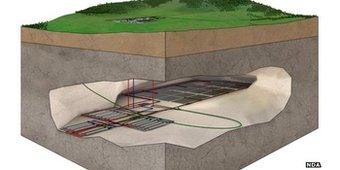Cumbria nuclear waste: Councillors 'intimidated', says peer
- Published

Radioactive waste contained in canisters would be buried beneath Cumbria
Allegations that Cumbria county councillors faced intimidation from anti-nuclear protesters may need to be looked at by police, energy minister Baroness Verma has said.
Last week, the council voted against the latest stage in the development of the waste facility.
A Tory peer claimed he had seen a "chilling" email saying anti-nuclear campaigners should "scare" councillors.
Baroness Verma said she would look "very carefully" at the allegations.
Cumbria had volunteered to consider housing nuclear waste in an underground storage facility, but the plan was vetoed by Cumbria County Council.
Lord Jenkin of Roding, a former minister, said he had obtained a copy of an email that was "inadvertently" sent to a Copeland councillor.
He said it referred to a plan to "scare the crap" out of councillors by informing them they might be "personally liable" for reckless decisions.
Three Cumbria councils voted on whether to proceed to the next stage in the process of investigating whether an underground nuclear waste store would be possible - and safe - in the county.
Although Copeland Borough Council voted in favour, Cumbria County Council ruled out Allerdale Borough and then also vetoed a move to this "Stage 4" for Copeland Borough.
Lord Jenkin said: "I am very worried indeed about how the Cumbria County Council councillors were persuaded to vote against moving to the next stage of the nuclear waste consultation."
"Is this any way to treat a serious government consultation?"
Lady Verma asked Lord Jenkin to forward her the email so her officials could examine it in more detail.
"I do know that passions were raised on both sides of the argument in Cumbria, but that is right and proper and a proper democratic process," she said.
But the minister added: "I will look very carefully and if it is something that I need to raise further and it looks like intimidation, I will take it as a matter for perhaps the police to look at."
Britain needs to find a site for the long-term underground disposal of high-level radioactive waste.
With some of it staying dangerous for up to 100,000 years, the government's agreed solution is to bury it - permanently.
- Published30 January 2013
- Published28 January 2013
- Published12 January 2013
- Published8 October 2012
- Published8 October 2012
- Published20 July 2012
- Published22 May 2012
- Published23 March 2012